Asian A.V. Club newsletter #8: Arvin Chen
Filmmaker Arvin Chen talks about his journey from international filmmaker to making his English language feature debut with 'Love in Taipei'.
Over the past 15 years, international filmmaker Arvin Chen has established himself as a strong voice in contemporary Asian cinema, deeply rooted in the Taiwan landscape. Though he was born in the US, it was a transformative internship in Taiwan that cemented his passion to become a film director.
He later returned to Taiwan to make his debut feature Au revoir Taipei in 2010. Showcasing a unique mix of whimsy and romance, the film captivated audiences worldwide with it’s unique colorful urban landscape and allowed for Chen to continue to tell stories from the city.
In his latest offering, Love in Taipei, Chen takes on a different approach to his Taiwan stories by not only directing his debut English language feature, but also in the YA genre.
We talked to Arvin about his latest project and discovered some interesting personal tidbits in the process!
Asian AV Club: Your first job in film was working for the award-winning Taiwanese director Edward Yang (Yi Yi: A One and a Two). What was it like having your first proper on-set experience being one that was shot outside the US?
Arvin Chen: To be honest with you, my first film set was on a movie Edward was producing and not on one of his own directed films; and it was chaotic (laughs). I think shooting in Taiwan, for better or for worse, is a lot less regimented. And I think that prepared me a little bit for when I was shooting my own movies.
My first four projects (Au revoir Taipei, 10+10, Will You Still Love Me Tomorrow, Mama Boy) were all shot in Taiwan. And that early experience prepared me for the chaos and the freestyle nature of Asian film sets. I have worked a little bit in America, and it's totally different. (laughs)
Asian AV Club: I love the fact that your foray into filmmaking was via an international route. You didn't do the typical, graduate from film school in the States, then make a film that gets into Sundance, and so forth… Your entrée into film was through an international entry point. Can you talk more about that?
Arvin Chen: It's funny that you mentioned that because when I when I graduated film school (USC), that was the ideal route everyone wanted to take. You get your short into Sundance, sign with an agency and you get a deal. I don't even know if that exists now, but that's what everyone thought was the right way to do it. So, my short didn’t get into Sundance, and it definitely didn’t bag me an agent. Add to the fact that as an Asian American, it was unfathomable to make my first movie in Hollywood. Forget calling it representation, stories about us were non-existent.
But my short film (Mai) DID get into Berlin Film Festival. And I met a producer (In-ah Lee) who helped me understand that you could go another route. Because I made the short in Taiwan, I had some connections. I also met producers, financiers and sales agents through international festivals. I didn't understand any of that before film school. I literally learned as I was doing it, that you could go to these markets, like in Cannes or in Busan, and find investors who are interested in collaborating on a film that way. I kind of just fell into it.
Asian AV Club: To then shoot your debut feature Au revoir Taipei, in Taiwan and in Mandarin, was that difficult for you? How fluent were you reading and writing in Mandarin?
Arvin Chen: I was I was semi fluent. But definitely was not fluent fluent. Again, I had to learn in the process. My first couple of scripts were written completely in English. And then I had them translated into Mandarin or Taiwanese to shoot. By the time I made my third film, I was fluent enough to write parts of the dialogue in Chinese. Just trying to figure out how to do something in a different language, is much much tougher when you’re starting out. The irony is, I haven't made a movie in my mother tongue of English until my fourth one. But this is just how it worked. It's kind of weird (laughs).
Asian AV Club: What is it about Taiwan that continues to fascinate you to tell stories there?
Arvin Chen: I think it’s the contrast. I grew up in a really boring American middle-class suburb. Cookie cutter houses, very idyllic, but nothing very exciting. My parents are from Taiwan, so visiting was the opposite experience. Taiwan is so vibrant, and with a pace that is exactly opposite of me growing up.
Getting to live there and work for Edward Yang in my early 20s is what I wanted to capture on film. That feeling that energy. Especially in my first movie, that was the way I shot that movie. Also, as a film nerd in my early 20s, I watched all these Asian movies that has this urban city energy and I wanted to emulate that.
Asian AV Club: Knowing your early work, I was pleasantly surprised to hear that you decided to try something different with Love in Taipei, which is not only based on the popular YA novel Loveboat, Taipei, by Abigail Hing Wen, but is a full-fledged English language rom com.
Arvin Chen: It was just the timing. It was in the middle of pandemic, and I was presented with this fully western American movie, to be shot in Taiwan with a very youthful foreign perspective. I thought that was interesting, because I've lived here in Taiwan for a decade and made three movies here and suddenly it's a chance to make something totally outside of what I've done before. I had made a similar type of movie three times and so I wanted to do something in the spirit of fun and see what it would feel like. And then after this film, I did an episode of Pachinko season 2, which was also something completely way out of what I’ve done before. I think the thinking behind these projects was like, what else can I do? Can I do a YA rom com or a historical melodrama and just try and experience different genres to figure out what would be the next thing for my own projects.
Asian AV Club: Growing up in Taiwanese American communities and even in Asia, everyone always knew of the Love Boat rite of passage for college aged Taiwanese kids. Did you ever attend the Love Boat?
Arvin Chen: No, I never went on it. I had friends that went. You know, the stereotype of this immersive summer program (aka The Overseas Compatriot Youth Study Tour to Taiwan), is that it’s really this crazy fun hook up camp. And I think everyone knows that. (laughs) Even the parents know that you're supposed to send your kid there to meet other eligible Taiwanese Americans and Chinese Americans. So, I think that, in of itself, is kind of funny.
For Love in Taipei, because this is done in a YA genre, it’s more of a youth fantasy version of Love Boat. I leaned into the essence of this program and heightened it to be just a fun story of a young woman experiencing a world she’s never been in.
Asian AV Club: How was it to find your leads (Ashley Liao, Ross Butler, Nico Hiraga and Chelsea Zhang), because chemistry is so important when it comes to rom coms.
Arvin Chen: We went through a pretty exhaustive search to find our cast. But what was even more interesting was watching them experience Taiwan, not just in the shooting, but just being there. At the time, there was like zero covid cases, so after they quarantined for two weeks, they were let out into the free world. I think all four have never been to Taiwan before, so watching them experience it was really cool. I think they all really fell in love, kind of like the way everyone falls in love with Taiwan.
Asian AV Club: Because this film comes from a western perspective of an outsider discovering her Asian heritage, how did you make sure that the film didn’t fall into Orientalist traps by exoticizing the east?
Arvin Chen: You’re always going to try to find a balance. It’s probably easier for me because of the experience of having made local movies. But this isn't for a local (Taiwanese) audience. I mean, if they like it, that's great. But (Love in Taipei) is designed for an international audience. Even if you’ve been to Taiwan, we are showcasing a very heightened world, but not to exoticize. We didn’t want to make this world feel so far removed from the Western world, because Taiwan is a nice balance of the West and the East. That's another thing that I really tried to depict, I wanted to show is this very modern, vibrant city, so much so that if I was a kid and I’d never been to Asia and stepped off a plane, I would love it here.
Asian AV Club: There’s something cool about how in the film Ever (Ashley Liao) finds her people when she goes on this trip. I’m just curious, is that what Asia’s been like for you?
Arvin Chen: Well, my wife is from Taiwan. My son was born in Taiwan. And all my movies were made in Taiwan. So, even though Ever is like this 20-year-old girl from the Midwest, I think that her experience was something that I could definitely draw on. Even within the confines of the YA genre and the fact that everyone is so young, as a director, I could still tap authentically into the experience of finding this new place that feels somewhat like home. It was buried deep down somewhere, but it was there (laughs).
Asian AV Club: I think a lot of people take it for granted that an all-Asian YA rom com like Love in Taipei, would have been impossible to make when you first got out of film school.
Arvin Chen: Oh definitely. When I graduated 15 years ago, a movie like this wouldn’t have been made back then. I mean, to think that an Asian American movie would have an audience outside of a film festival back then, it’s crazy to think that we can now have this kind of reach.
Asian AV Club: How has making this film and directing an episode of Pachinko season 2 kind of given you a different creative perspective on you as a filmmaker?
Arvin Chen: These two projects weren’t self-developed or self-written, and it’s given me a bit of freedom and distance from what I’ve been doing before. I think I’m less restricted and whatever thing I’m going to do next, I’m just going to think about things in a broader way.
Asian AV Club: I love how I’m using Ever’s plot to talk about you, but in the film, she is not sure about telling her parents that she wants to be a dancer instead of a doctor. Did you ever have ‘the talk’ with your parents about your career choice? How did it go down?
Arvin Chen: My parents are pretty progressive for first generation immigrants, but even as a younger person, when I wanted to do art or movies or music, there was more concern about that kind of stuff. By the time I was an adult, and I still wanted to pursue the arts, they were pretty supportive about it. Because I think I had gone to college and gotten a safe degree [architectural design], and they saw that there could be a real career around making films, it loosened them up a bit more.
It is funny to compare me to Ever’s story because she's like this 20-year-old girl that I can still kind of relate to. (laughs) In my 20s, that was what I was struggling with. Do you do something that's safe? It’s something that I think Asian Americans still go through.
When I was starting out, there were fewer successful stories look to. But I think now, there's so many Asian American filmmakers, actors and creatives, that hopefully when someone in their 20s or teens wants to do it, I imagine the parents are less skeptical about it.
Asian AV Club: I mean, we won the Oscar. So, that definitely helped.
Arvin Chen: Yes, that did. (laughs)


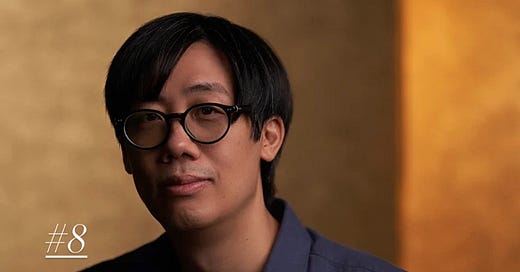


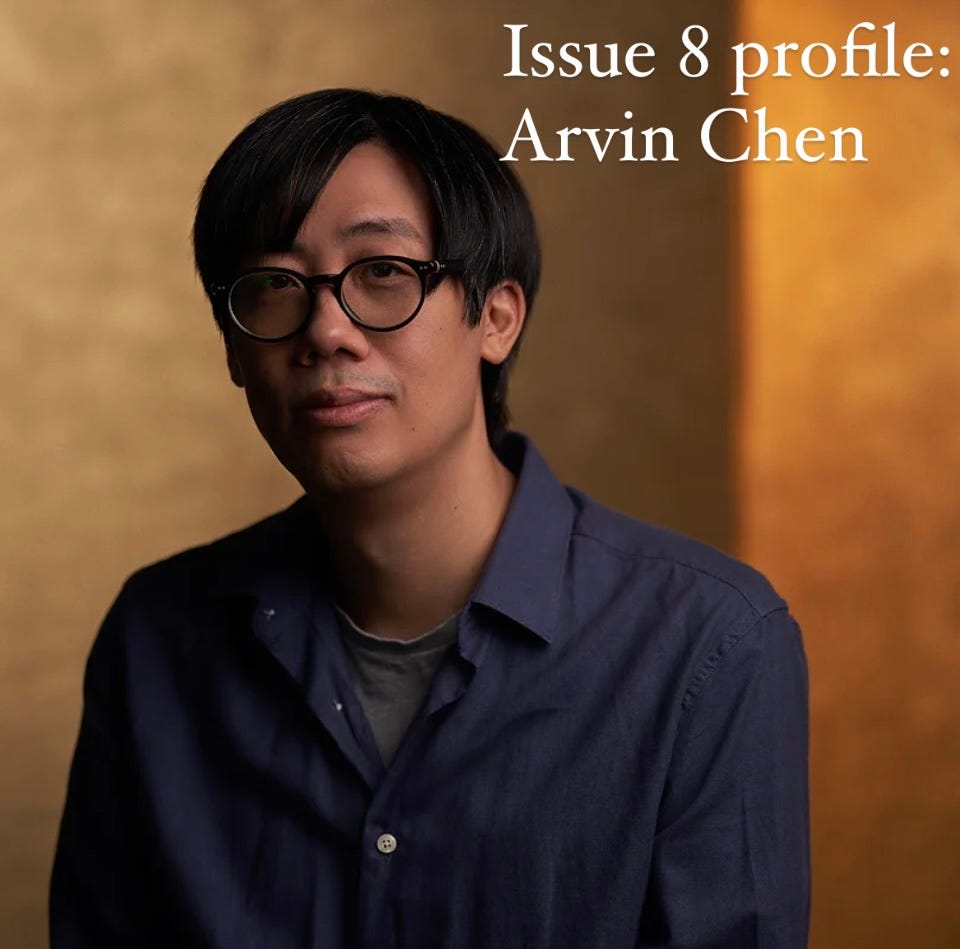
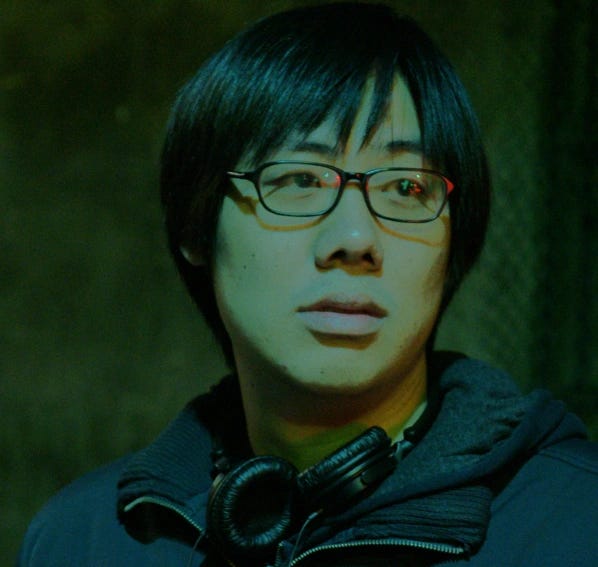

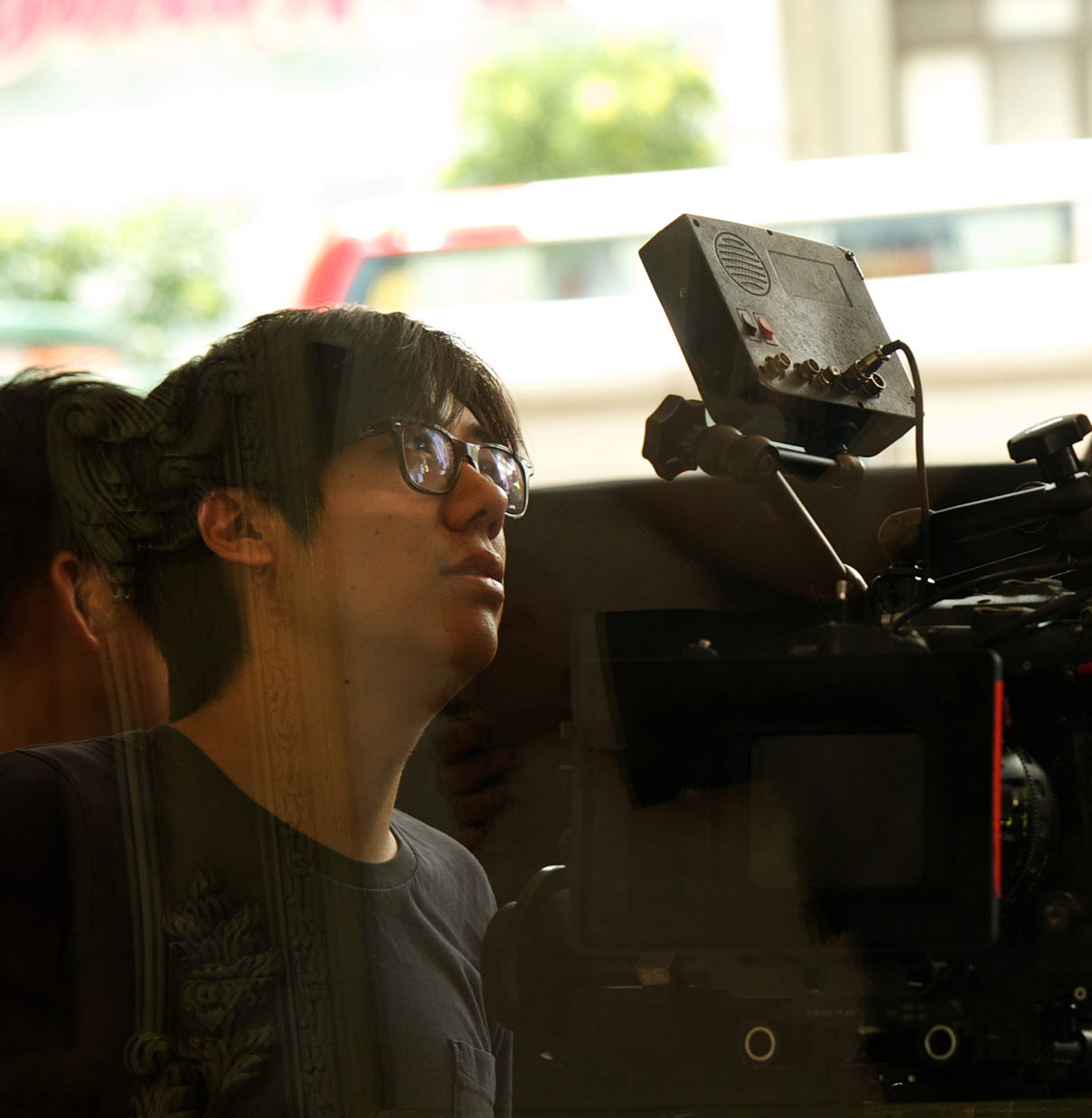
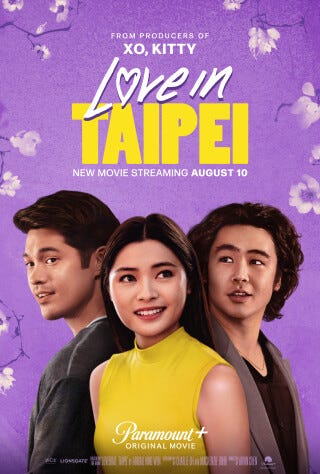


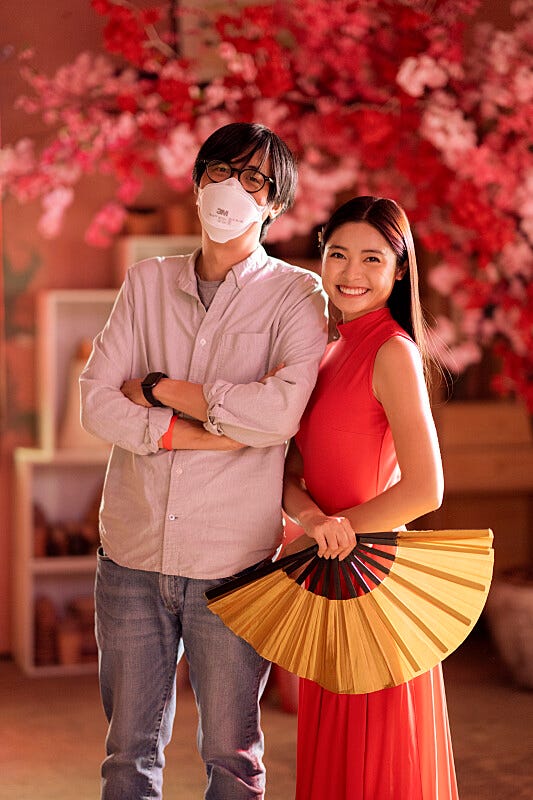
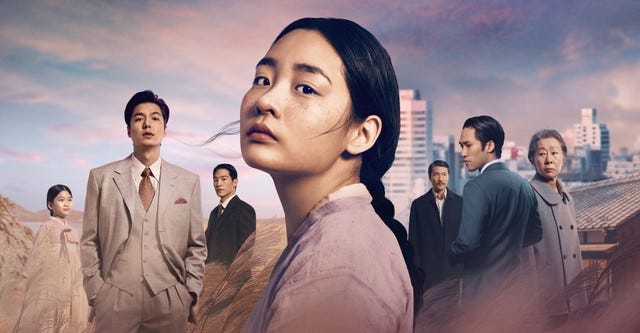
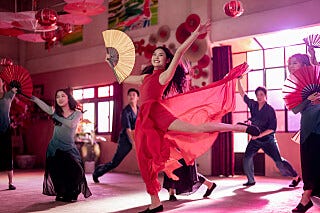
Nice interview - and really making me pine for Taipei !